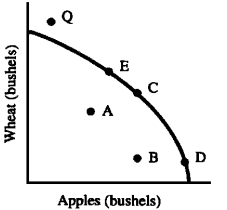Exam 3: The Fundamental Economic Problem: Scarcity and Choice
Exam 1: What Is Economics?227 Questions
Exam 2: The Economy: Myth and Reality150 Questions
Exam 3: The Fundamental Economic Problem: Scarcity and Choice250 Questions
Exam 4: Supply and Demand: An Initial Look308 Questions
Exam 5: An Introduction to Macroeconomics211 Questions
Exam 6: The Goals of Macroeconomic Policy207 Questions
Exam 7: Economic Growth: Theory and Policy223 Questions
Exam 8: Aggregate Demand and the Powerful Consumer214 Questions
Exam 9: Demand-Side Equilibrium: Unemployment or Inflation?211 Questions
Exam 10: Bringing in the Supply Side: Unemployment and Inflation?223 Questions
Exam 11: Managing Aggregate Demand: Fiscal Policy205 Questions
Exam 12: Money and the Banking System219 Questions
Exam 13: Monetary Policy: Conventional and Unconventional205 Questions
Exam 14: The Financial Crisis and the Great Recession61 Questions
Exam 15: The Debate over Monetary and Fiscal Policy214 Questions
Exam 16: Budget Deficits in the Short and Long Run210 Questions
Exam 17: The Trade Off between Inflation and Unemployment214 Questions
Exam 18: International Trade and Comparative Advantage226 Questions
Exam 19: The International Monetary System: Order or Disorder?213 Questions
Exam 20: Exchange Rates and the Macroeconomy214 Questions
Select questions type
If the U.S.government decides to increase military spending,one opportunity cost will be lower spending on education.
(True/False)
4.8/5  (30)
(30)
During World War II,Hitler would often order his army to hold a particular town or river "at all costs." Was this rational? If so,explain.If not,indicate which economic idea it violated.
(Essay)
4.9/5  (37)
(37)
In terms of efficiency,any point on a production possibilities frontier is as good another.
(True/False)
5.0/5  (42)
(42)
A typical economy produces thousands of different goods.Is it accurate to say that society faces a production possibilities frontier?
(Multiple Choice)
4.8/5  (36)
(36)
The definition of efficiency implies that production is carried out on the production possibilities frontier.
(True/False)
4.7/5  (45)
(45)
Opportunity cost is the combined value of all other alternatives that go unchosen.
(True/False)
4.8/5  (42)
(42)
Why might the money price for something be higher than the opportunity cost? Why might it be lower? Give an example of each to illustrate your answer.
(Essay)
4.9/5  (34)
(34)
If production involves increasing opportunity cost,then moving nearer the horizontal axis will increase the opportunity cost of
(Multiple Choice)
4.8/5  (43)
(43)
Which of the following characteristics of a PPF indicates that tradeoffs must be made?
(Multiple Choice)
4.8/5  (36)
(36)
Division of labor has caused output to rise dramatically since the industrial revolution.
(True/False)
4.7/5  (37)
(37)
Figure 3-4
 -Which of the following would make point Q in Figure 3-4 attainable?
-Which of the following would make point Q in Figure 3-4 attainable?
(Multiple Choice)
4.8/5  (40)
(40)
Explain the relationship between opportunity costs and money costs.Can they be treated as identical?
(Essay)
4.9/5  (35)
(35)
For a given production possibilities frontier,which points are attainable?
(Multiple Choice)
4.8/5  (36)
(36)
The principle of comparative advantage explains specialization and trade among countries but not among individuals.
(True/False)
4.9/5  (43)
(43)
Both conservatives and liberals tend to approve of markets because
(Multiple Choice)
4.8/5  (38)
(38)
Showing 161 - 180 of 250
Filters
- Essay(0)
- Multiple Choice(0)
- Short Answer(0)
- True False(0)
- Matching(0)